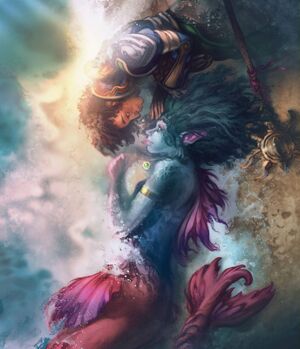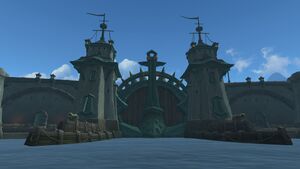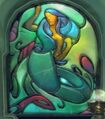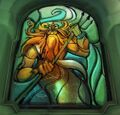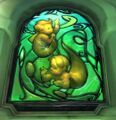Mermaid
Mermaids are female beings with humanoid upper bodies and the lower bodies of fish. They are mainly known from Kul Tiran folklore but have also been mentioned elsewhere.
Kul Tiras
Description

According to Kul Tiran folklore, mermaids lived openly near Boralus in its oldest days, when it was still only a fledgling town. The people of the town had all seen the beings—mostly by spotting them when they sat on the rocks to watch the human ships—and knew them to be as real as sirens or murlocs. They had human-like torsos, webbed hands, fish's tails in place of legs, and beautiful faces and long curly hair that were colored all the shades of seaweed and coral. They hatched from eggs in clutches that could consist of several dozen. Each individual was allotted a certain amount of the Mother's power from birth, and once that power was used up, the mermaid turned into a sizzle of bubbles and died, leaving no trace behind. Because of this, and because they were naturally selfish, they did not like to use their power over rocks and water lightly. Mermaids were still considered young at a hundred years old, and thrifty individuals that conserved their power might live to be five hundred. They were passionate beings who cried easily and did nothing by halves.
Mermaids made their homes in underwater caves and Drust ruins located far deeper than any human could dive. Some human pearl-divers falsely claimed that they lived in palaces filled with treasure from sunken ships, but in truth, their only wealth was pearls, which they considered hardly more valuable than pebbles. They clung to rocks before storms to hunt the boils of fish coming into Boralus Harbor for safety, and sometimes sat out on the sea ice to plait their hair. They were ignorant or contemptuous of the humans and often competed with fishermen for their catch. While they did cause some human deaths, it was mostly from foolishness rather than malice. Unlike sirens, mermaids did not seek to enthrall humans; on the contrary, they considered sirens lazy and murlocs deplorable.[1]
However, due to the aforementioned behavior, the inhabitants of Boralus came to view mermaids as portents of storms and poor fishing. It was held as common knowledge that the worst storms were presaged by the sight of mermaids on the rocks, and the worst winters by the sight of mermaids sitting on the sea ice. The humans eventually came to believe that the mermaids brought the storms themselves (rather than simply portending them) and that sighting a mermaid on the first day of a voyage doomed the journey to failure. Before long, all of Boralus told tales about mermaids scuttling ships, becalming the waters or making them choppy (whichever one the sailors hadn't wanted at the time), dragging humans down into the water to drown them,[1] or swimming by ships to lure sailors to their doom.[2] If mermaids were spotted near a ship, the sailors usually threw rocks or lanterns at them. The tidesages warned people against these superstitions, but only to a point.[1]
Why the mermaids left Boralus
This dim view of mermaids changed as the result of a young mermaid named Halia, who loved to watch ships go by and fell in love with Ery, a tidesage serving aboard the Windward. Her dozens of sisters called her a fool for approaching the ships even though she knew that the sailors hated her, but Halia insisted that she had to watch over the humans to see if she could help them. The sailors of the Windward wanted to kill or scare off the mermaid, but Ery forbade them from doing so. Halia started leaving gifts for Ery when the Windward was anchored in Boralus Harbor. The tidesage was touched by this and became attracted to Halia's beauty as well, and the two eventually met in the harbor and confirmed their love for each other. Halia asked Ery to come live with her underwater, explaining that if she waited until dawn, slit her feet from the toes to the heels, and then walked into the harbor, the Mother would take pity on her and turn her into a mermaid. Ery refused, citing her duties as a tidesage, and stated that they had to keep their relationship secret or else her crew would reject her.
One day a great storm came to Boralus, threatening to destroy the town. Ery and the other tidesages traveled to the river's mouth to try to hold back the water, but they faltered one by one until only Ery was left. Halia vowed to help her beloved by constructing a wall of rocks and mud on the seabed, a task she poured more and more of herself into even though the effort threatened to kill her. This brave intention caused a crest of the Tidemother's magic to sweep through the harbor, jolting all of Halia's sisters awake. They shouted at their sister to stop, for while they were not frightened by the storm or concerned for Boralus, they had never conceived that one of their own might pay a price for it. After failing to convince Halia, they threw themselves into her labor and were soon joined by other mermaids who did the same. Together they built the wall higher and higher until it breached the surface and continued to rise under Ery's feet. Some of the oldest mermaids died and turned into bubbles in the process, their power spent, but the rest didn't stop working until the wall towered over the harbor. At this point, Ery collapsed from exhaustion and fell into the harbor. Without her power, the waves crashed into the wall, but it held steady. The crew of the Windward—who had watched the events unfold—brought Halia and the seemingly-dead Ery aboard their ship. Halia slit her beloved's feet with a knife and then jumped back into the harbor with her. There, the Mother transformed Ery into a mermaid, allowing her and Halia to be together at last.
All of Kul Tiras now knows Ery's story. As long as Boralus' seawall has stood, its people now swear on mermaids as symbols of highest honor and good luck, as well as sacrifice, for no mermaids were ever seen in the harbor again.[1]
Other
- The naga Meridith was known as "the Mermaiden".
- The stained glass windows in Ulduar's Hall of Memories and Descent into Madness include depictions of what appear to be mermaids, bearded mermen wielding tridents, and children with the tails of fish.
- One of the worlds that Illidan Stormrage saw during his search for Nathreza was a dead ocean world where the corpses of "merfolk" lay entwined around rafts of dead kelp.[3]
- What appears to be a mermaid skeleton can be found east of the Murloc Hideaway on Exile's Reach.

